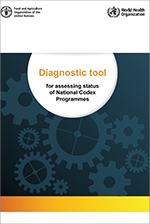Codex Alimentarius
The Codex Alimentarius, or “Food Code”, is a collection of international standards, guidelines and codes of practice to protect the health of consumers and ensure fair practices in the food trade. Codex standards are used worldwide to harmonize national food safety regulations and are recognized in the WTO Agreement on the Application of Sanitary and Phytosanitary (SPS) Measures as the international reference point for food safety. When food producers and traders comply with Codex standards, consumers can trust the safety and quality of the products they buy and importers can have confidence that the food they ordered will meet the specifications.
The standards are adopted by the Codex Alimentarius Commission, which currently comprises 188 Member Countries, 1 Member Organization (EU) and more than 230- Observers (intergovernmental organizations, non-governmental organizations and United Nations agencies). The Commission, also known as CAC, was established in 1963 by the Food and Agriculture Organization of the United Nations (FAO) and the World Health Organization (WHO) to protect consumer health and promote fair practices in the food trade. The legitimacy and universality of Codex standards depend on the effective participation of all Codex membership.
FAO’s work in support of Codex
Codex standards are based on the best scientific and technical knowledge. FAO works in collaboration with WHO to provide food safety scientific advice in support of Codex Alimentarius’ standard setting activities, a foundational element of global food safety governance. This includes holding a number of expert meetings (JECFA, JEMRA, JEMNU, ad hoc expert meetings) every year and actively supporting relevant Codex Committees, including those on food additives, contaminants in foods, residues of pesticides and veterinary drugs, and methods of analysis and sampling.
FAO’s food safety capacity development activities supports developing countries and countries in transition to participate more effectively in Codex and translate Codex standards into national legislation or regulations through a wide range of activities both upstream and downstream of standard setting:
- Assisting countries to formulate national legislation based on Codex, as well as implementing and enforcing food standards harmonized with Codex.
- Strengthening the national process for consultation, communication & management of Codex work.
- Establishing the policy framework and use of Codex as a basis for national food control.
- Developing capacities of countries to contribute with data and expertise to the development of scientific opinions that underpin Codex discussions.
These activities are implemented using FAO’s training resources and e-learning courses to strengthen knowledge of Codex rules and procedures and improve national planning for Codex participation and preparedness of Codex delegations.
The FAO/WHO Codex Trust Fund is another key initiative complementing FAO’s capacity development efforts in facilitating effective participation in Codex. Building on the success of the FAO/WHO Project and Fund for Enhanced Participation in Codex, also known as the Codex Trust Fund (CTF), which ran from 2004-2015, a new initiative of the Codex Trust Fund (CFT2) was launched in 2016. CTF2 is designed to provide support to individual countries or groups of countries to address specific barriers at national level that inhibit full and effective engagement in Codex at national, regional and international levels. The aim is to develop Codex structures at national level in a manner that will be sustainable over time.
Being a multi-donor trust fund, CTF2 relies on contributions from the governments of Codex member countries to enable it to continue to build strong and sustainable national Codex systems that will allow all countries to participate fully and effectively in the work of Codex.




